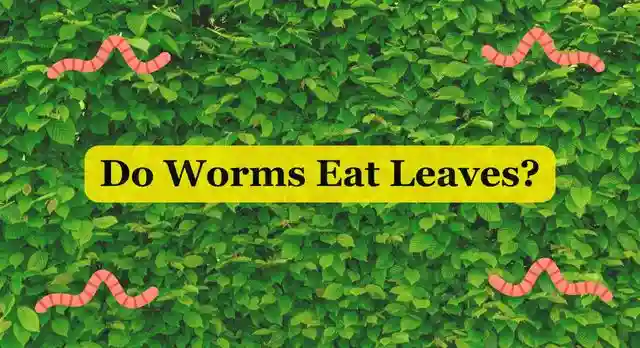Do Worms Eat Leaves? Unveiling the Habits of Earthworms
Worms, with their fascinating burrowing abilities and beneficial contributions to soil health, have long intrigued gardeners and nature enthusiasts. As gardeners tend to their plants, the question often arises: do worms eat leaves? In this article, we will explore the dietary preferences of worms, particularly earthworms, and their relationship with leaves. Get ready to dive into the captivating world of leaf-munching worms!

Do Worms Eat Leaves?
The short answer is yes, worms do eat leaves, but they prefer leaves in an advanced stage of decomposition rather than fresh, green foliage. Earthworms are not equipped to chew or consume intact leaves effectively. Instead, they rely on the microbial activity and decomposition processes that occur on decaying leaves. The microbial breakdown softens the leaves and makes them more accessible for worms to consume.
The Process of Leaf Consumption
When leaves begin to decompose, they release compounds and chemicals that attract microorganisms, fungi, and bacteria. These microorganisms break down the leaves further, releasing nutrients and creating a more digestible food source for worms. Earthworms feed on the decomposed leaves and organic matter, ingesting the particles and processing them in their digestive system. The digested material is then excreted as nutrient-rich worm castings, which benefit the soil and provide valuable nutrients for plants.
Benefits of Worms Eating Leaves
The consumption of leaves by worms offers several benefits for both the worms and the overall soil ecosystem:
Nutrient Cycling: As worms feed on decomposing leaves, they help break down the organic matter and release nutrients back into the soil. This nutrient cycling process enriches the soil, making essential elements more available for plant uptake.
Soil Improvement: Worms create tunnels as they move through the soil, promoting aeration, water infiltration, and the movement of beneficial microorganisms. This tunneling activity enhances soil structure, improves drainage, and supports root growth.
Organic Matter Decomposition: By consuming leaves and organic debris, worms accelerate the decomposition process. Their feeding activities contribute to the breakdown of plant material and the conversion of organic matter into humus, which improves soil fertility.
Tips for Encouraging Leaf Consumption by Worms
To maximize the leaf-munching abilities of worms in your garden, consider the following tips:
Leaf Mulching: Shred fallen leaves and use them as a natural mulch around your plants. This provides a ready food source for worms and creates a favorable environment for decomposition.
Composting: Set up a composting system and include a mixture of leaves and other organic materials. The compost heap will attract worms, providing them with an abundant supply of decomposing leaves.
Avoid Chemicals: Minimize the use of chemical fertilizers and pesticides, as they can harm worms and disrupt the delicate balance of the soil ecosystem.
Read more about – What does earthworm eat?
Conclusion
In conclusion, worms, particularly earthworms, do eat leaves but prefer them in a decomposed state. By feeding on decomposing leaves and organic matter, worms contribute to nutrient cycling, soil improvement, and organic matter decomposition. Creating a garden environment that promotes leaf decomposition and provides a habitat for worms can enhance soil fertility, support plant growth, and foster a healthier ecosystem.
Key Takeaway
- Worms are detritivores that primarily feed on decomposing organic matter, including leaves.
- Earthworms do eat leaves, but they prefer leaves in an advanced stage of decomposition.
- The microbial breakdown of leaves makes them more accessible for worms to consume.
- Worms contribute to nutrient cycling, soil improvement, and organic matter decomposition.
- Shredded leaves can be used as mulch or added to compost to attract and support worms in the garden.
Embrace the leaf-munching abilities of worms and harness their remarkable benefits for a thriving garden ecosystem. By understanding their dietary preferences and implementing practices that encourage leaf decomposition, you can foster a harmonious relationship between worms and leaves, nurturing the health and vitality of your plants.
Read More
Do earthworms eat leaves?
Yes, earthworms eat leaves. They are known as detritivores, which means they consume decaying organic matter like leaves. Earthworms play an important role in breaking down dead leaves, helping with the decomposition process and returning nutrients back to the soil.
Can I put leaves in my worm farm?
Yes, you can put leaves in your worm farm. Worms can consume and break down leaves as part of their diet. It’s best to shred the leaves into smaller pieces before adding them to the worm farm to make it easier for the worms to eat them.
Do worms eat dry leaves?
Yes, worms can eat dry leaves, but they prefer leaves that are partially decomposed. Dry leaves take longer to break down, so it’s helpful to moisten them before adding them to the worm bin. The moisture helps soften the leaves and aids in the decomposition process.
Are leaves good for a worm bin?
Yes, leaves are beneficial for a worm bin. They provide a source of organic matter and help create a balanced environment for the worms. However, it’s important to mix the leaves with other types of food scraps to ensure a diverse diet for the worms.
